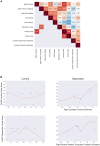Decreased Response to Positive Facial Affect in a Depressed Cohort in the Dorsal Striatum During a Working Memory Task-A Preliminary fMRI Study
- PMID: 30890968
- PMCID: PMC6411826
- DOI: 10.3389/fpsyt.2019.00060
Decreased Response to Positive Facial Affect in a Depressed Cohort in the Dorsal Striatum During a Working Memory Task-A Preliminary fMRI Study
Abstract
People with depression have shown alterations in processing emotional information and working memory functionality. There is some evidence that emotional content may interact with working memory update processes, however neurological correlates are current unknown. In this preliminary study we utilized a novel version of the emotional variant of the n-back working memory task in fMRI. We examined BOLD response of 14 healthy controls and 13 depressed participants in response to happy, sad, and neutral displays of facial affect. No accuracy or reaction time differences were found between the two groups. The depressed group showed significantly decreased BOLD response to happy faces compared to the control group areas of the dorsal striatum and anterior cingulate. Significant, moderate, positive associations were found between right caudate activation with anxiety score and anterior cingulate activation with depression score in those with depression. Our novel task was able to elicit group level differences in emotional processing during working memory update. These results suggest those with depression fail to differentiate between positive emotional stimuli and stimuli with no emotional content.
Keywords: depression; dorsal striatum; emotional processing; fMRI; n-back; working memory.
Figures





Similar articles
-
Brain activation during processing of genuine facial emotion in depression: Preliminary findings.J Affect Disord. 2018 Jan 1;225:91-96. doi: 10.1016/j.jad.2017.07.049. Epub 2017 Jul 27. J Affect Disord. 2018. PMID: 28802727 Review.
-
The impact of happy and angry faces on working memory in depressed adolescents.J Exp Child Psychol. 2018 May;169:59-72. doi: 10.1016/j.jecp.2017.12.012. Epub 2018 Jan 16. J Exp Child Psychol. 2018. PMID: 29342446
-
Neural correlates of perception of emotional facial expressions in out-patients with mild-to-moderate depression and anxiety. A multicenter fMRI study.Psychol Med. 2011 Nov;41(11):2253-64. doi: 10.1017/S0033291711000596. Epub 2011 May 6. Psychol Med. 2011. PMID: 21557888
-
Neural markers of symptomatic improvement during antidepressant therapy in severe depression: subgenual cingulate and visual cortical responses to sad, but not happy, facial stimuli are correlated with changes in symptom score.J Psychopharmacol. 2009 Sep;23(7):775-88. doi: 10.1177/0269881108093589. Epub 2008 Jul 17. J Psychopharmacol. 2009. PMID: 18635699 Clinical Trial.
-
Emotional valence modulates brain functional abnormalities in depression: evidence from a meta-analysis of fMRI studies.Neurosci Biobehav Rev. 2013 Feb;37(2):152-63. doi: 10.1016/j.neubiorev.2012.11.015. Epub 2012 Dec 1. Neurosci Biobehav Rev. 2013. PMID: 23206667 Review.
Cited by
-
Bias of Attentional Oscillations in Individuals with Subthreshold Depression: Evidence from a Pre-Cueing Facial Expression Judgment Task.Int J Environ Res Public Health. 2022 Nov 6;19(21):14559. doi: 10.3390/ijerph192114559. Int J Environ Res Public Health. 2022. PMID: 36361443 Free PMC article.
-
Cilia in the Striatum Mediate Timing-Dependent Functions.Mol Neurobiol. 2023 Feb;60(2):545-565. doi: 10.1007/s12035-022-03095-9. Epub 2022 Nov 2. Mol Neurobiol. 2023. PMID: 36322337 Free PMC article.
-
Psychiatric Characteristics, Symptoms of Insomnia and Depression, Emotion Regulation, and Social Activity among Swiss Medical Students.J Clin Med. 2024 Jul 26;13(15):4372. doi: 10.3390/jcm13154372. J Clin Med. 2024. PMID: 39124639 Free PMC article.
-
Distinct Effects of Anxiety and Depression on Updating Emotional Information in Working Memory.Int J Environ Res Public Health. 2022 Dec 29;20(1):544. doi: 10.3390/ijerph20010544. Int J Environ Res Public Health. 2022. PMID: 36612866 Free PMC article.
-
Event-Related Potential to Conscious and Nonconscious Emotional Face Perception in Females with Autistic-Like Traits.J Clin Med. 2020 Jul 21;9(7):2306. doi: 10.3390/jcm9072306. J Clin Med. 2020. PMID: 32708073 Free PMC article.
References
LinkOut - more resources
Full Text Sources

